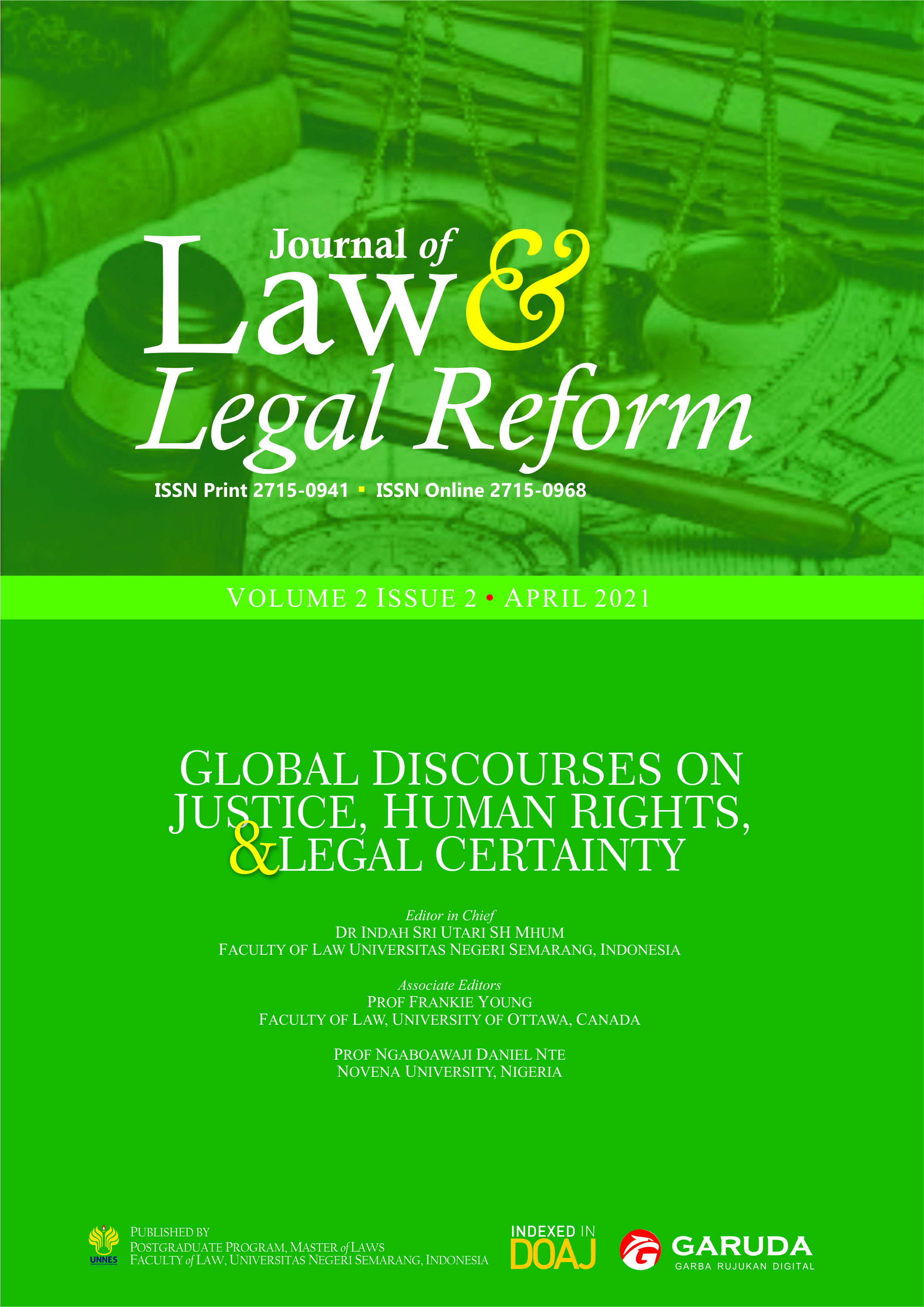Subjective Well Being with Antisocial Behavior in Adolescents Case of Babalan Village Wedung Demak (A Criminological Perspective)
Main Article Content
Abstract
This research aims to determine the relationship between subjective well being antisocial behavior towards adolescents. The hypothesis proposed is that there is a negative relationship between the welfare of the subject with antisocial behavior is the higher or positive well-being of the subjective, the lower the antisocial behavior of adolescents who live in the village Babalan Wedung Demak or vice versa. The subjects of the study were teenagers residing in Babalan Wedung Demak village. Sampling technique in this research by using random sampling. The measuring instrument used is the scale of subjective well-being and the scale of antisocial behavior residing in the Babalan Wedung Demak area. The data in the analysis using Product Moment Pearson correlation. Based on the analysis of Product Moment Pearson obtained rxy = -0.252 with a significance of 0.008 (p <0.01) means there is a negative relationship between the subjective well being with antisocial behavior is the higher or positive well being of the subjective than the lower antisocial behavior of adolescents residing in the village Babalan Wedung Demak. The lower or negative the well-being of the subjective, the higher the antisocial behavior in adolescents who live in Babalan Wedung Demak village. Based on the results of the analysis is also known variable well-being subjective has empirical average subjective scores on the scale of the well-being of the subject 34.51 and while the hypothetic score of 32.5. This shows that the subjective well-being in this study has a moderate average.
Article Details
All writings published in this journal are personal views of the authors and do not represent the views of this journal and the author's affiliated institutions. Author(s) retain copyrights under a Creative Commons Attribution-NonCommercial-ShareAlike 4.0 International (CC BY-NC-SA 4.0).
References
Azwar, S. (2013). Psychologist scale compilation. Yogyakarta: Learning Library.
Azwar, S. (2013). Compilation of psychological scales. Yogyakarta: Learning Library.
Compton, W. (2005). Introduction to Positive Psychology. Psychology, 2, (3).
Devina, N. (2012). Social Psychology. Jakarta: Erlangga.
Diener, D., & Lucas, L. (2009). Subjective Well Being The Science Of Happines And Life Satisfaction. New York: Oxford University Press.
Diener, D., & Scollon, S. (2003). Subjective well being is desirable, but not the summun bonum. Paper delivered at the University of Minnesota interdisciplinary Workshop on Well Being. Psychology, 2, (5).
Duran, MV, & Barlow, H. (2007). Abnormal psychological essence. Yogyakarta: Student Library.
Fery, S. (2010, February Wednesday). Antisoial Personality Disorder. Antisoial Personality Disorder, pp. 10, 1.
Hare, R. (2008). Development and Personality of People. Jakarta: Arcan.
Hefferon, K., & Boniwell, I. (2011) Positive Psychology Theory, Reasearch and Applications. New York: Mc Graw Hill.
Here, SV, & Priyanto, PH (2014). Subjective Well Being in Adolescents in terms of Environmental Awareness. Psychodimensia, 13. 1.
Here, SV, & Priyanto, PH (2014). Subjective Well-Being in Adolescents in terms of Environmental Awareness. Psychodimensia, 13(1), 10-21.
Idianto, M. (2013). Specialization Group of Social Sciences. Jakarta: Erlangga.
Imelda, NA, & FN, O. (2008). The relationship of gratitude and subjective well being on the poor. Psychology, 14, (1).
Jeffery, N. (2005). Abnormal Psychology. Jakarta: Erlangga.
K. M, DC, & R, PA (2005). Consequences of relationship status and quality for subjective well-being. Journal of Social and Personal Relationship, 22(6).
Kastutik, & Setyowati, RN (2014). Differences in Antisocial Behavior of Adolescents Judging from Parents' Parenting Patterns at SMP Negeri 4 Bojonegoro. Moral and citizenship studies, 2(1), 174-189.
Lykken, & Tellegen. (1999). Subjective Well Being The Science Of Happines and a Proposal For A National index. New York: Oxford University Express.
M, PT, & H, S. (2009). The Subjective Wellbeing of Transgender Commercial Sex Workers (CSWs). Psychodynamics, II(2).
Marianti, A., Anies, & Abdurachim, H. r. (2015). Increase in Blood Lead Levels and the Emergence of Antisocial Behavior of Brass Craftsmen. Public Health Journal, 11(1), 144-154.
Nolen, N. (2007). Antisocial Personality, Psychology of dynamics, 1(2).
Permana, A., Sopyan, A., Kusmayadi, G.-G., & Fatah, RA (2015, May Thursday). Papers Antisocial and Free Association. Antisocial and Free Sex Papers, pp. 7, 1.
Permana, A., Sopyan, A., Kusmayadi, G.-G., & Fatah, RA (2015, May Thursday). Antisocial Behavior and promiscuity. antisocial behavior and promiscuity, pp. 7,2.
Puspitasari, I., Adi, H., & Supriyono, M. (2014). Relationship between family support and peer-to-peer interaction with anti-social behavior in adolescents at SMA Gita Bahari Semarang. Social Health, 3(1).
Putri, DR (2016). The Role of Social Support and Emotional Intelligence on Subjective Wellbeing in Early Adolescents. Indigenous Journal, 1(1), 12-22, ISSN: 0854-2880.
Radlis. (2016, July 13). Central Java Tribune. Retrieved March 24, 2017, from Tribun Jateng: http://jateng.tribunnews.com/2016/07/13/kronologi-penangkap-penggorok-leher-driver-gojek-di-tanah-mas
Radlis. (2016, February 13). Central Java Tribune. Retrieved March 7, 2016, from TRIBUNNEWS.COM: http://www.tribunnews.com/video/2016/02/13/kepala-dusun-bobol-30-rumah-kosong
Rahmania, AM, & Suminar, DR (2012). The Relationship Between Perception of Parental Control and the Tendency of Delinquency Behavior in Adolescents Who Have Been Involved in Brawls. Journal of Educational and Developmental Psychology, 1(3).
Reksoatmodjo, TN. (2009). Statistics for psychology and education. Bandung: Refika Aditama.
Rismawati. (2010). Mental Health Task (subjective well being). Jakarta: Gunadarma.
Rizqia, R. (2008). Relationship Between Self-Efficacy and Subjective Well Being in Policemen with Multiple Role. Yogyakarta: UGM Psychology Faculty.
Rizqia, R. (2008). The relationship between self-efficacy and subjective well-being in policewomen plays a dual role. Yogyakarta: Faculty of Psychology UGM.
Safarina, NA, Mawarpury, M., & Sari, K. (2014). Subjective Wellbeing of Patients with Type II Diabetes Mellitus Based on Education Level. Journal of Integrative Psychology, 2(1), 62-70.
Simanullang, DS, & Daulay, W. (2010). Antisocial behavior of teenagers in private high schools like Madiun. Psychologydinamic, 5(1).
Sri, S. (2009). Sociology 1 class X SMA / MA. Jakarta: Books of the Ministry of National Education.
Sugiyono. (2014). Qualitative quantitative research methods and R&D. Bandung: Alfabeta.
Tuti, S. (2010, February Wednesday). Antisocial Behavior. Antisocial Behavior, pp. 12, 2.
Utami, M.S. (2012). Religiosity, Religious Coping, and Subjective Wellbeing. Journal of Psychology, 39(1), 46-66.
